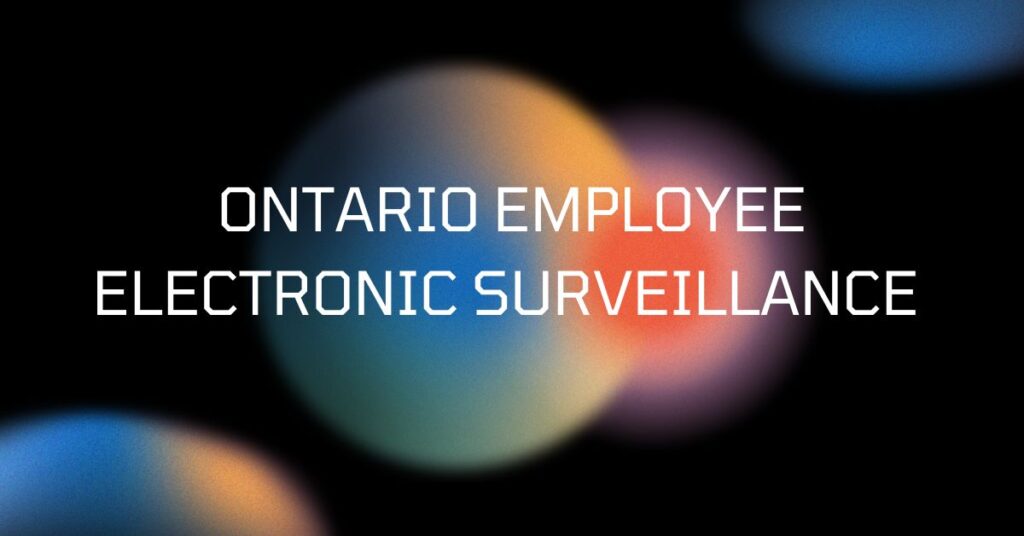In Ontario, a new law has gone into effect that alters the legal rights and responsibilities regarding employee electronic surveillance.
Have you ever questioned whether your boss is monitoring your work? The moment to ask is now. This week, a new law in the province of Ontario goes into effect, requiring companies to notify workers if they are being watched while they are at work. Given the continued popularity of remote and hybrid working arrangements, remote workers will also benefit from the knowledge and protection provided by this regulation.
What Is Meant by the New Law?
Businesses with more than 25 employees in Ontario are now legally required to have an officially documented electronic monitoring policy in place under the new Working For Workers Act. It must provide to its staff all tracking information. This written policy needs to include:
Confirmation whether staff are tracked
How the electronic surveillance is carried out
In what conditions does it occur?
The reason for gathering this information and data
How Many Companies Keep an Eye on Employees?
According to a recent poll, up to one-third of Canadian companies use electronic surveillance and monitoring of their employees. According to the same survey, only 37% of workers in the organizations that use electronic monitoring had signed agreements and acknowledgement papers about the practice.
Do Remote Workers Need to Know This?
Indeed. Regardless of where they work, employers are required by the new rule to notify their staff members of any electronic surveillance. Employees have the right to know about any and all types of employee electromagnetic monitoring that their employers are carrying out, whether they are working in the corporate office, at home, or when making deliveries.
This includes employees working remotely using company equipment. The same legal protections against unidentified electronic surveillance by their employers apply to remote workers who use company-issued laptops in their home offices.
The Working for Workers Act: What is it?
The Working For Workers Act is legislation passed by the Ontario provincial government in the fall of 2021. During the COVID-19 epidemic, it enacted a number of programs aimed at assisting provincial workers in acclimating to new work conditions.
The Act’s prohibition on businesses having no formal policy on work-related communications after business hours was one of its most well-liked features. Employers were now required to establish formal policies regarding emails, phone calls, and text messages sent to staff members after their workday ended, as a result of the “right to disconnect.” Employees who are suffering from the very real and severe impacts of burnout as a result of working too much are expected to benefit from less after-hours tasks.
As professionals continue to adapt to altered work habits following the epidemic, new regulation regarding employee tracking like Controlio has been implemented as an additional component of the Working For Working Act.
Is It Legal for Your Employer to Follow You?
Indeed. The use of electronic surveillance by employers is not prohibited by this new regulation. Employers are permitted to poll, monitor, and track workers while they are at work as long as they provide written policies that comply with the new law’s requirements and educate workers about all electronic monitoring. Uninformed electronic surveillance and employee tracking are still possible because the new measure exempts businesses with less than 25 employees from having to implement such a strategy.
How Can I Be Electronically Surveilled by My Employer?
Employees can be monitored electronically using a variety of techniques. Among the more popular ones is tracking:
Using the keyboard and mouse with keylogger software
Written correspondence, including SMS and emails
Websites visited and information entered
Using screenshots to view a computer’s screen
GPS-based location and movement data
The new rule gives workers the right to know whatever electronic surveillance and monitoring techniques are being applied to all work gadgets, whether they are being used locally or remotely.
Is It Possible to Stop My Employer from Monitoring My Work?
No, provided that it is expressly included in the employment contract that new hires sign. Even if the practice is controversial with employees, it is legally permitted to continue under this new measure as long as a documented policy is in place alerting all employees about electronic surveillance and tracking that takes place during working hours.
ALSO READ: Navigating Legal Challenges in ICV Certification in the UAE

